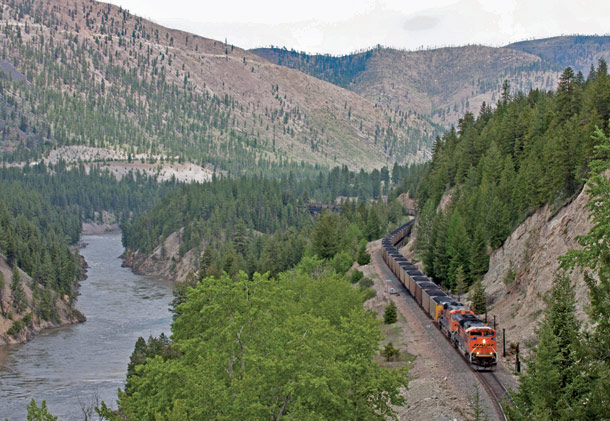The Whitefish City Council is asking the Surface Transportation Board to hold a public hearing in Northwest Montana about the construction of a new railroad more than 500 miles away over concerns it could bring coal trains to the Flathead Valley.
The Whitefish City Council voted unanimously on Aug. 2 on a resolution to send a letter to STB Chairman Daniel Elliot about the city’s concerns over the proposed Tongue River Railroad near Miles City.
But officials with BNSF Railway, partial owner of the proposed Tongue River Railroad, says the concerns are unfounded because it is unlikely coal from the proposed Otter Creek Mine would be routed through Northwest Montana.
The Tongue River Railroad is a proposed 83-mile rail line that would connect the Otter Creek Mine with BNSF’s existing rail lines in southeast Montana. Before it can be constructed, it needs approval from the STB. The proposed line has been met with vocal opposition from local ranchers who don’t want to give up their land to coal trains and environmentalists who worry about the long-term impacts. The Missoula City Council recently passed its own resolution asking the STB to hold public hearings there regarding the project.
The issue was brought to the Whitefish City Council by Glacier Climate Action volunteer coordinator Steve Thompson at a meeting in August. Thompson said if the railroad and mine are built there could be additional rail traffic through the valley and that could cause problems locally.
“With this resolution you’re asking the STB to take into consideration our concerns here in Whitefish and west of the divide,” Thompson said. “Whitefish has a lot of interest in this and this makes sure that we have a voice at the table.”
The resolution also gained support from Jan Metzmaker, speaking on behalf of the Whitefish Convention and Visitors Bureau. She said that an increase in freight traffic, particularly oil trains from North Dakota, has had a significant impact on Amtrak’s Empire Builder and that freight trains could make it worse. The train is frequently three to five hours late and in June the westbound Empire Builder, train no. 7, stayed on schedule a scant 10 percent of the time. The eastbound train, No. 8, had a zero percent on-time rate.
Officials with BNSF Railway said the Tongue River Railroad would have little to no impact on the rail lines through Whitefish. Railroad spokesperson Matt Jones, who attended the Sept. 2 city council meeting, said that while BNSF moves more than 40 coal trains a day out of Wyoming’s Powder River Basin, only five loaded coal trains came through the Flathead Valley in 2013. This year, BNSF has only moved two loaded coal trains on its northern route through Montana. A vast majority of coal that is moved west across Montana takes the southern route across the state through Bozeman, Helena and Missoula.
“Presently the Hi Line route bears very little coal traffic,” Jones said. “Freight destinations are determined by our customers, and our routing analysis considers many factors, allowing traffic flows to change significantly. However, nothing at this time indicates that a substantial amount of coal traffic originating on the Tongue River Railroad in southeast Montana will travel through Whitefish.”
